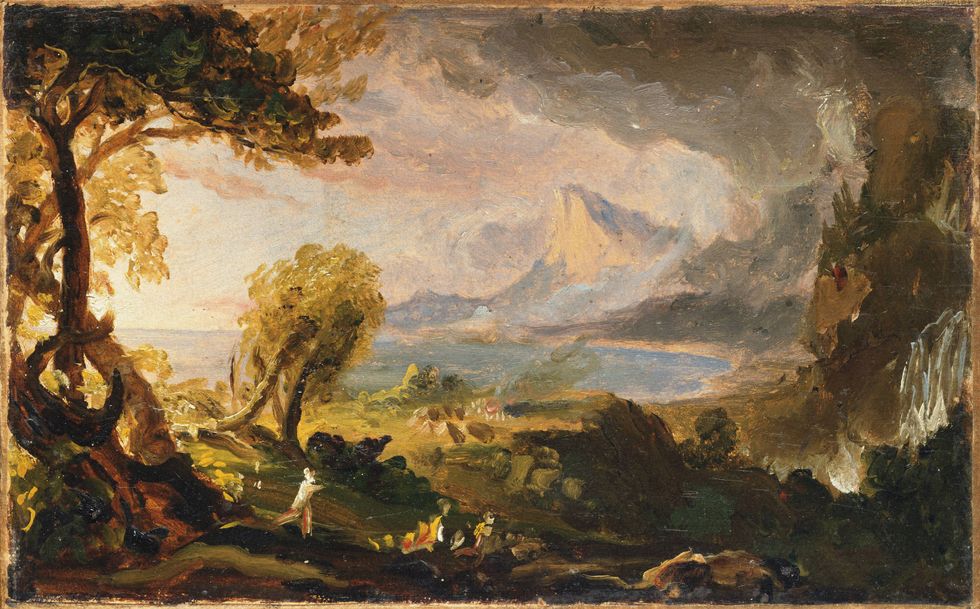Today the reading of History is at peak popularity with the public. Bestsellers like David McCullough’s “John Adams” and Doris Kearns Goodwin’s “Team of Rivals” have taken the bookstores by storm. History is now both accessible and popular to the general reader, thanks to the prolific writings of scholars like Evan Thomas or Douglas G. Brinkley.
Our purpose here is not to dissect the merits of “Popular History” – a controversial topic itself – but to examine the legacy of a once popular writer now largely forgotten by the general public.
Bernard DeVoto was born in Ogden, Utah in 1897, the son of an Italian father and a lapsed Mormon mother. Raised in the isolated, sparsely populated regions of the American West, he stood out from an early age for his keen intellect and voracious reading. A child of religious skeptics, he stood out from his peers as a loner, a freethinker, and a budding intellectual.
After a short time at the University of Utah – which he left following the firing of some unorthodox professors – DeVoto enrolled at Harvard, where he pursued the study of his twin passions, history, and literature. Eschewing the fashionable study of European or diplomatic history, DeVoto chose to specialize in the west, a region with which he had a complex relationship.
Though he had little love for his hometown and its rural parochialism, the historian possessed an abiding love for the west – its history, its people, and its wide open spaces.
After a short stint as a teacher – during which time he experienced one of his periodic bouts of depression – DeVoto recovered his fortunes and secured a position at Northwestern, where he met and married his wife, Avis.
At Northwestern DeVoto’s rising star shone brightly. His sparkling prose and outspoken liberalism earned him a place as a popular essayist, allowing him entry into the exciting literary world of the 1920’s. DeVoto’s early novels — he had not yet begun to write history — gained him respect as a writer and in 1927 he obtained a position at Harvard.
Here, the historian’s western background and blunt-spoken nature began to work against him. Though he coveted Harvard tenure, he never attained a permanent professorship, remaining an outsider in the university’s waspish environment.
But his fame as a writer grew steadily. His 1932 biography “Mark Twain’s America” established him as an authority on the great novelist, and soon led to a monthly column for Harper’s Magazine.
In the meantime, Devoto prospered as a literary critic. He briefly ran New York’s “Saturday Review of Literature” and gained notoriety as a perceptive, if acerbic, judge of novels. He feuded with Thomas Wolfe and Sinclair Lewis; the latter penned an essay entitled “Fools, Liars, and Mr. DeVoto.”
Yet, DeVoto’s contrarian nature worked to his advantage. Manic productivity and pugnacious wit characterized his elegant, fast-moving prose style. Having largely given up the pursuit of fiction, DeVoto now turned to his first and deepest passion – the writing of history.
“1846: The Year of Decision” was the first volume of DeVoto’s great western trilogy. The other volumes – “The Course of Empire” and “Across the Wide Missouri” – followed shortly, and together constitute DeVoto’s single largest contribution to history. “1846” is a narrative history of the soldiers, pioneers, and mountain men who traveled west on the eve of the Mexican war, forming the spearhead of Manifest Destiny; “Across the Wide Missouri” is an engaging history of the fur trade, the West's first great business; and “The Course of Empire” is a sprawling history of exploration from the Vikings to the American West.
DeVoto’s other works – including a classic edition of the Lewis and Clark journals and a quixotic study of cocktails, “The Hour” – date from this productive period.
DeVoto was more than just an author. From the 1940’s onward he became a prominent voice for conservationism, civil liberties, and other progressive causes. At Harvard, he mentored the rising undergraduate Arthur Schlesinger Jr., imbibed dedicated to American history, liberal politics, and well-crafted prose.
Unlike most modern historians, DeVoto did not cater exclusively to the academic community or the general public. Rather, he sought to reach both average readers and the academy, combining lively writing with serious academic research.
DeVoto’s productivity was fortunate, for his career was sadly short. Stricken by a heart attack in 1955, he died suddenly at age 58. He left behind reams of novels and histories, an unfinished work of western ecology, and scores of diverse essays. His influence on historical writers – from Arthur Schlesinger to Wallace Stegner – was enormous, and he remains regarded as one of the foremost historians of the west. Rarely has another scholar written so much, about so much, in such a tragically short time.















